#Empowering marginalized communities for justice
Explore tagged Tumblr posts
Text
Transgender and gender-nonconforming people continue to fight for equal rights, despite persistent attacks from conservative lawmakers both in the United States and abroad.
“Advocacy and support for trans, nonbinary, and intersex people is so important right now because we are seeing such an onslaught of targeted attacks coming from the Trump administration,” says Shane Diamond, director of communications and advocacy at GLAAD. “We've seen state executive orders that try to dehumanize us, that try to strip away our rights.”
While many members of the LGBTQ+ community might not feel safe in the US, trans women of color remain the most vulnerable to discrimination and violence. WIRED spoke with advocacy groups that work to protect and empower trans people, so you can better understand how to support members of your community.
Recognize the Humanity of Others
If you’re a cisgender (no, it’s not a slur) person, where can you start? It’s quite simple. “The most humane thing to do is to recognize our humanity. Some people are truly of the belief that we don’t deserve a place in the world,” says Tiommi Luckett, a senior national organizer for Positively Trans at the Transgender Law Center. “I think they need to see our humanity and recognize that we’re not asking for special rights.”
Don’t assume you understand the nuances of a trans person’s experience based on preconceived ideas or someone else’s opinion. While it’s important to recognize the difficulties and discrimination that trans people (or people of any marginalized group) face, the vibrancy and nuances of their lives are not often represented in the media. “We need to see trans joy more visibly present in the world,” says Camila Camaleón, a former administrative coordinator at Gender Justice LA.
Get Involved With Local Organizations
National organizations can be a force for good, but you are likely to feel more connected to those around you (and potentially have a greater impact) by getting involved with an advocacy group that’s local. What trans rights groups are nearby? If you’re in the United States, check out this list from our sister publication Them to find a group that might be closer to home. Entries are included from all 50 states. Located in the UK? Trans Unite is one website you can use to find groups near you.
Listen to Trans People of Color
“Centering ourselves is not selfish,” says Ezak Perez, an executive director at Gender Justice LA. “We should be centering ourselves and each other, so that we can go out there and really fight for the issues that are impacting our communities.” The work of an ally is not to take charge of the situation. Instead, it’s about listening to the leadership from marginalized people and following. “We don’t necessarily need people to be leading,” they say. “But, we need people to really come on board and fight alongside us.”
If You Haven’t, Register to Vote
“It’s just so critical that people take the time to register to vote, and then vote,” says Sasha Buchert, a director of the Non-Binary and Transgender Rights Project at Lambda Legal.
She mentioned consistent voting as one of the most important actions an ally can take, especially for younger people who support equal rights but might not show up often to the polls on election day.
Contact Your Representatives
Going beyond just voting, Buchert recommends calling the leaders of your local government and asking them what they’ve done recently to protect the lives of trans constituents. “I guarantee you there are other people who are opposed to trans folk that know the system,” she says. “They know the power of talking to their state legislators.” Visit this website to find contact information for your local elected representative in the US, and go here if you’re located in the UK.
Speak Out Against Harassment
“Many people will stay silent because they're afraid of getting things wrong,” says Casey Pick, director of law and policy at The Trevor Project.
“What we need now, especially in a time when there is so much misinformation and so much hostility out there, is our allies to speak up,” Pick says. Even less overt examples of transphobia, like a snide comment made by a friend, still actively contribute to the hostile environment experienced by trans and gender-nonconforming people.
“It’s not a joke for us to be attacked on the street simply for being who we are,” says Luckett. It can be frightening and dangerous to intervene if you see harassment occurring in public, but you have multiple options as a bystander, like distraction or documentation.
This webcomic from NPR is a great resource for bystanders who want to better understand how to react, in the moment, to harassment.
Support the Cause Year-Round
Anyone who is financially able should consider making donations to trans-centered support groups, all year long, not just during pride month.
“I'm not like trans Cinderella,” says Diamond. “I don't go back to being cis on July first. If people are feeling excited and empowered to show up as allies, keep doing that even when pride season is over. As we know, the attacks against trans people have been coming all year, and we will continue to be here.”
Also, donations to small, local groups can have an outsized impact on their ability to provide resources to the surrounding community.
Why is fighting for trans rights so important? “None of us are safe, until we all are safe,” says Luckett. “My liberation is definitely tied to your liberation, and everyone’s liberation. Because when we liberate Black trans people, then liberation is possible for everyone.”
23 notes
·
View notes
Text
Achieving Global Peace and Justice: The Crucial Role of Goal 16 and Strong Institutions
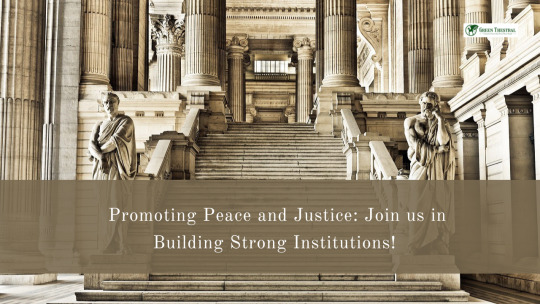
In an ever-changing and interconnected world, achieving peace and justice is of paramount importance for the well-being and progress of societies. Sustainable Development Goal 16 (SDG 16), aptly named "Peace, Justice, and Strong Institutions," recognizes the significance of establishing robust governance structures, promoting peaceful and inclusive societies, and ensuring access to justice for all. This article delves into the essence of Goal 16 and highlights its vital role in fostering peace, justice, and strong institutions worldwide.
Understanding SDG 16 and Its Significance
SDG 16, part of the United Nations' 2030 Agenda for Sustainable Development, holds significant importance in addressing some of the most pressing global challenges. It acknowledges the inseparable connection between peace, justice, and strong institutions as crucial foundations for sustainable development and the well-being of societies worldwide. By setting this goal, the United Nations aims to provide a comprehensive framework that guides countries in their efforts to create peaceful, just, and inclusive societies.
At its core, SDG 16 recognizes that without peace and stability, sustainable development becomes unattainable. Armed conflicts, political instability, and social unrest not only lead to immense human suffering but also impede progress in various areas such as education, health, and economic growth. By prioritizing peace, the goal acknowledges the urgent need to address the root causes of violence, prevent conflicts, and build societies that can thrive in an atmosphere of tranquility.
In addition to peace, justice is an essential pillar of SDG 16. It emphasizes the importance of establishing fair and effective legal systems that ensure equal access to justice for all individuals, regardless of their socio-economic background. Access to justice is not limited to formal legal processes but extends to broader aspects, such as addressing grievances, resolving disputes, and promoting human rights. By ensuring access to justice, societies can guarantee the protection of fundamental rights, reduce inequalities, and foster social cohesion.
Strong institutions form another critical aspect of SDG 16. These institutions encompass a wide range of entities, including governments, public administrations, judicial systems, and law enforcement agencies. They play a pivotal role in upholding the rule of law, promoting good governance, and ensuring accountability at all levels. Strong institutions provide a stable framework that enables countries to effectively respond to the needs of their citizens, protect human rights, combat corruption, and provide essential services. By strengthening institutions, countries can establish an environment conducive to sustainable development and the realization of the other Sustainable Development Goals.
SDG 16 outlines specific targets and indicators to guide countries in their efforts to achieve peace, justice, and strong institutions. These targets include reducing all forms of violence and related death rates, ending abuse, exploitation, trafficking, and all forms of violence against children, promoting the rule of law at the national and international levels, and significantly reducing corruption and bribery. Additionally, the goal aims to ensure responsive, inclusive, participatory, and representative decision-making processes, strengthen the capacity of institutions at all levels, and ensure public access to information and fundamental freedoms.
To achieve these targets, countries need to develop comprehensive strategies, policies, and action plans tailored to their specific contexts. This requires multi-sectoral collaboration involving government entities, civil society organizations, the private sector, and citizens themselves. It is crucial to address the underlying factors that contribute to violence, inequality, and weak institutions, such as poverty, lack of education, discrimination, and social exclusion. By adopting a holistic approach and integrating the principles of SDG 16 into their national agendas, countries can make significant strides towards building peaceful and just societies.
Moreover, achieving SDG 16 requires international cooperation and partnerships. Many of the challenges related to peace, justice, and strong institutions transcend national boundaries, necessitating collective action. Countries can collaborate on sharing best practices, exchanging knowledge and expertise, and providing financial and technical assistance to support capacity building efforts in developing nations. By working together, the international community can promote peacebuilding, conflict prevention, and the strengthening of legal systems globally.
SDG 16 plays a pivotal role in the global pursuit of sustainable development. By recognizing the interconnectedness of peace, justice, and strong institutions, this goal provides a comprehensive framework for countries to eradicate violence, reduce corruption, promote good governance, and ensure equal access to justice. The successful achievement of SDG 16 not only contributes to the well-being of individuals and societies but also creates an environment conducive to the realization of all the other Sustainable Development Goals. Through collective action and commitment, countries can build a world where peace, justice, and strong institutions prevail.
The Link between Peace, Justice, and Sustainable Development
Peace and justice are intricately interconnected with sustainable development. Without peace, societies face constant conflicts, hindered progress, and widespread poverty. Similarly, without justice, marginalized communities struggle to access essential services, experience discrimination, and live in perpetual insecurity. Achieving sustainable development requires addressing the root causes of violence, establishing just systems, and providing equal opportunities for all individuals, regardless of their background.
Building Strong Institutions for Effective Governance
Strong institutions are the backbone of a functioning society. They uphold the rule of law, protect human rights, and ensure accountability. Such institutions foster trust between citizens and governments, creating an environment conducive to economic growth and social stability. Through effective governance structures, governments can address societal grievances, reduce corruption, and promote transparency, ultimately leading to stronger and more inclusive societies.
Advancing Peaceful and Inclusive Societies
Peaceful and inclusive societies are vital for achieving SDG 16. By promoting social cohesion, dialogue, and inclusivity, countries can reduce violence, prevent conflicts, and create a harmonious environment where all individuals can thrive. Investing in education, empowering marginalized communities, and fostering intercultural understanding are key components in building societies that value diversity and promote peaceful coexistence.
Reducing Violence and Crime Rates
SDG 16 emphasizes the need to reduce all forms of violence and crime. Violence, whether it is domestic, interpersonal, or related to armed conflicts, hampers development efforts and negatively impacts individuals, families, and communities. Through the implementation of effective policies, investments in crime prevention, and promoting conflict resolution mechanisms, countries can create safer environments that enable their citizens to lead fulfilling lives.
Tackling Corruption and Promoting Transparency
Corruption undermines trust in institutions, distorts the allocation of resources, and exacerbates inequality. SDG 16 highlights the importance of combating corruption at all levels and promoting transparency in governance. By establishing robust anti-corruption measures, implementing accountable practices, and encouraging citizen participation, countries can foster an environment of integrity, thus bolstering public trust and promoting sustainable development.
Ensuring Access to Justice for All
Equal access to justice is a fundamental human right and a cornerstone of SDG 16. Many individuals, particularly vulnerable populations, face barriers when seeking justice, including financial constraints, discrimination, and inadequate legal systems. By strengthening legal institutions, providing legal aid, and promoting fair and efficient judicial processes, countries can ensure that justice is accessible to all, regardless of their socioeconomic status.
Promoting International Cooperation and Partnerships
Achieving SDG 16 requires global collaboration and partnerships. Addressing transnational crime, promoting the rule of law, and strengthening institutions at the international level are essential components of Goal 16. By fostering cooperation among countries, sharing best practices, and providing financial and technical assistance to developing nations, the international community can work collectively towards peace, justice, and strong institutions worldwide.
Conclusion
Goal 16, "Peace, Justice, and Strong Institutions," recognizes the indispensable role of peace, justice, and effective governance in achieving sustainable development. By promoting peaceful and inclusive societies, reducing violence and crime, tackling corruption, ensuring access to justice, and fostering international cooperation, countries can create a world where all individuals can live in dignity, security, and prosperity. To create a better future for all, it is crucial that governments, organizations, and individuals join forces to support and implement the targets of SDG 16, working towards a more peaceful and just world.
#Achieving peace and justice#Strong institutions for sustainable development#Importance of Goal 16 in the 2030 Agenda#Promoting peace and justice globally#Sustainable development through strong institutions#Eradicating violence and corruption with Goal 16#Access to justice and equality for all#Building peaceful and inclusive societies#Role of governance in achieving Goal 16#Strengthening legal systems for justice#Addressing the root causes of violence#Combating corruption for sustainable development#Promoting transparency and accountability#Establishing fair and effective institutions#Role of international cooperation in Goal 16#Empowering marginalized communities for justice#Conflict prevention and peacebuilding strategies#Creating a world with strong institutions#Ending violence and promoting social stability#Ensuring access to justice for vulnerable populations#Reducing crime rates through Goal 16#Fostering trust between citizens and institutions#Advancing the rule of law for peace#Promoting good governance at all levels#Strengthening judicial processes for justice#Investing in education for peaceful societies#Breaking the cycle of violence through Goal 16#Transparency and accountability in governance#International partnerships for peace and justice#Achieving sustainable development through Goal 16
1 note
·
View note
Text
Support the Inclusive Democracy Act of 2023 (H.R.6643 / S. 3423)
An open letter to the U.S. Congress
576 so far! Help us get to 1,000 signers!
Despite his 34 felony convictions, Donald Trump has the wealth, connections, and privilege to ensure he doesn’t have to worry about his eligibility to vote this fall. But the millions of ordinary Americans currently disenfranchised by felony convictions aren’t so lucky. That's why, as your constituent, I urge you to co-sponsor and support the Inclusive Democracy Act of 2023 (H.R.6643 / S. 3423) to guarantee voting rights to ALL Americans. Right now, Jim Crow-style felony disenfranchisement laws deny voting rights to over 4.4 million Americans. The Inclusive Democracy Act of 2023 comprises a series of transformative measures that would end the broken system of felony disenfranchisement and empower marginalized communities: - Guaranteeing the right to vote in federal elections to all Americans who have criminal convictions. - Eliminating state-level barriers that prevent individuals with criminal convictions, whether they are incarcerated or have been released, from exercising their right to vote in federal elections. - Ensuring citizens in carceral settings have access to information about elections and candidates 29 Members of Congress have signed on as sponsors or co-sponsors of the Inclusive Democracy Act of 2023. If you haven’t already, please join your colleagues and add your name to that list. And if you’re already a co-sponsor – thank you, and please do everything you can to help pass this groundbreaking legislation into law.
▶ Created on October 14 by Jess Craven · 575 signers in the past 7 days
📱 Text SIGN PGODGR to 50409
🤯 Liked it? Text FOLLOW JESSCRAVEN101 to 50409
#JESSCRAVEN101#PGODGR#Inclusive Democracy Act#Voting Rights#Felony Disenfranchisement#Support Voting Rights#H6643#S3423#Vote For All#Empower Marginalized Communities#End Jim Crow Laws#Voting For Everyone#Voting Is A Right#Reform Voting Laws#Criminal Justice Reform#Restoration Of Voting Rights#Civil Rights#Access To Voting#Electoral Justice#Join The Movement#Sign The Petition#Advocate For Change#Fair Elections#Democracy For All#Voices For Change#Civic Engagement#Social Justice#Vote2023#Legislative Action#Congressional Support
2 notes
·
View notes
Text
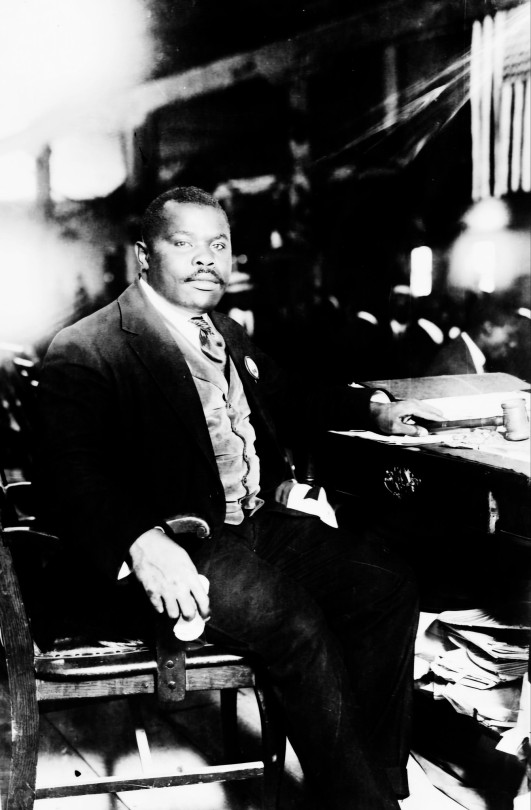
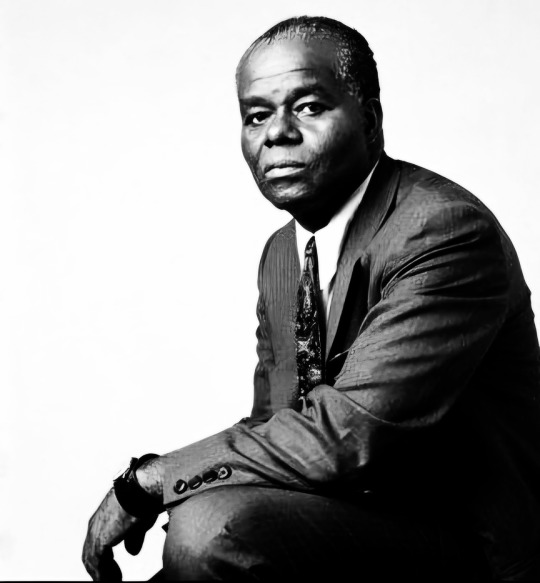
Why Dr. John Henrik Clarke Is Correct About Black People Having No Friends (and why We Don’t Need Any) – a Garveyite Perspective
Dr. John Henrik Clarke famously stated, “Black people have no friends.” For many, this may sound harsh, but it is a sobering truth when viewed through the lens of Pan-Africanism and Marcus Garvey’s philosophy. Garvey understood that Black liberation can not depend on external allies; it must come from within—rooted in self-reliance, unity, and a shared commitment among Black people globally.
Here’s why, Dr. Clarke’s statement rings true and why, from a Garveyite perspective, Black people don’t need friends—only each other.
1. History Proves It
From colonialism to the civil rights era, supposed "friends" of Black people have repeatedly betrayed or abandoned us. Other groups have leveraged Black struggles for their own gains, only to leave Black people behind once their goals were achieved.
Post-slavery labour movements excluded Black workers.
Civil rights coalitions saw other groups gain rights, while Black people remained trapped under systemic racism.
Garvey and Clarke both saw these betrayals as evidence that Black people must prioritize their own interests and stop relying on others.
2. Global Anti-Blackness Is Real
Anti-Blackness isn’t confined to one region—it’s a global phenomenon. Across continents, Black people face systemic oppression, discrimination, and dehumanization.
Other groups often form alliances to protect their own power while marginalizing Black voices.
Even in spaces of shared oppression, anti-Blackness often takes precedence.
Dr. Clarke’s assertion and Garvey’s vision both point to this truth: Black liberation must come from within because no one else will prioritize us.
3. Dependency Leads to Exploitation
Depending on outside "friends" or "allies" often comes with hidden costs. Foreign aid, alliances, and solidarity movements often prioritize the interests of others over Black liberation.
Aid to African nations often perpetuates dependency rather than fostering self-sufficiency.
"Allies" in social justice movements often centre their struggles, leaving Black people to fight alone.
Garvey warned that dependency breeds vulnerability. Clarke reinforces this: Black people must build their own systems to avoid exploitation.
4. We Have Everything We Need
Garvey believed that Black people possess the resources, talents, and ingenuity needed for liberation.
Africa’s wealth: With its vast natural resources, Africa can fund global Black empowerment if reclaimed from exploitative systems.
Diaspora talent: Across the globe, Black communities excel in innovation, creativity, and resilience.
Dr. Clarke’s statement echoes Garvey’s vision: We don’t need friends because we already have all the tools for success.
5. Cultural Exploitation Is Proof of No True Friendship
Black culture—music, art, fashion, and more—is celebrated globally, but Black people are rarely compensated or empowered by their own creations.
Other groups profit from Black innovation while perpetuating anti-Black systems.
Cultural exploitation demonstrates a lack of true solidarity.
Garvey’s solution: Black people must reclaim their culture and use it as a tool for empowerment, not exploitation.
6. Unity Is Our Greatest Strength (and Threat to Oppressors)
A united global Black community is the most powerful weapon against systemic oppression. Garvey emphasized unity, and Clarke’s assertion underscores why others fear it:
A unified Black world challenges global power structures that thrive on division.
By focusing on internal unity, Black people strengthen themselves and disrupt oppressive systems.
7. Allies Often Divide Us
Alliances can create divisions within Black movements, as external influences pit factions against each other or dilute the focus on Black liberation.
During the civil rights movement, alliances often marginalized more radical Black voices.
Today, funding from external groups can cause conflicts between grassroots Black organizers and larger organizations tied to outside agendas.
Garvey’s emphasis on self-reliance offers a solution: Black unity must come first, free from outside interference.
8. Other Groups Prioritize Their Own Interests
Every group prioritizes its own survival and progress—it’s not wrong, but Black people must learn from this.
White nations maintain global alliances to uphold their dominance.
Asian nations focus on economic self-sufficiency.
Jewish communities have built strong networks to protect and uplift their people.
Garvey and Clarke would agree: It’s time for Black people to do the same and put themselves first.
9. Historical Success Through Self-Reliance
History proves that Black people thrive when they rely on themselves:
The Haitian Revolution succeeded because enslaved Africans united and rejected external dependence.
Garvey’s UNIA (Universal Negro Improvement Association) built businesses, schools, and a global movement without outside help.
These examples show that self-reliance works. Black people don’t need friends—they need focus.
10. True Liberation Is Self-Determined
Liberation can not be outsourced, gifted, or borrowed—it must be self-determined. Allies may help temporarily, but no one will prioritize Black liberation over their own interests.
Garvey envisioned a world where Black people controlled their own economies, politics, and resources.
Clarke’s assertion reminds us that we can’t afford to waste time seeking validation or support from others.
11. Black Liberation Threatens Global Power Structures
Both Garvey and Clarke understood that Black liberation isn’t just a struggle for freedom—it’s a direct threat to the systems of power that dominate the world.
A free and united Africa would undermine Western economic dominance, which relies on exploiting African resources.
A globally empowered Black diaspora would disrupt industries, politics, and systems built on anti-Blackness.
This explains why no other group can truly be a friend to Black liberation. Their survival often depends on maintaining the status quo that oppresses us.
12. “Allies” Often Centre Themselves in Our Struggles
Even when other groups claim to stand in solidarity with Black movements, their involvement often centers their own experiences, narratives, and priorities.
Non-black allies frequently shift attention to their struggles, leaving Black people to carry the burden of fighting for everyone else.
Movements like Black Lives Matter have seen external groups co-opt their messages for personal or political gain.
Garvey’s philosophy reminds us to stay focused on our own goals and not allow our movements to be hijacked.
13. Romanticizing External Help Distracts from Pan-African Solutions
One of the pitfalls of seeking allies is the belief that external help is necessary or even superior. This mindset can prevent Black people from exploring Pan-African solutions.
Garvey’s vision of “Africa for Africans” called for African nations and the diaspora to work together without relying on foreign nations or systems.
Clarke’s statement reinforces this idea: the best solutions come from within. Black people don’t need external friends—they need internal unity.
14. Allies Often Maintain Anti-Black Systems
Even so-called “progressive” allies often uphold the same systems that oppress Black people.
Corporations claiming to support racial justice continue to exploit African resources and labour.
Governments speaking out against racism still engage in policies that harm Black communities worldwide.
Dr. Clarke and Garvey both understood this hypocrisy. Real liberation requires rejecting systems that perpetuate oppression, even if they claim to support us.
15. Our Focus Should Be on Building Future Generations, Not Pleasing Others
Garvey often emphasized the importance of preparing future generations to lead and succeed independently.
Clarke’s warning about having no friends reinforces this: Why waste time seeking allies when we could be building schools, economies, and systems that empower our children?
A Garveyite perspective prioritizes creating a legacy of self-reliance and leadership that ensures the survival and progress of Black people globally.
By focusing on the future, Black people can stop relying on the approval or assistance of others and instead secure their own destinies.
Final Reflection: All We Have Is Us, and That’s Enough
Dr. John Henrik Clarke’s statement and Marcus Garvey’s philosophy both lead to the same conclusion: Black people must take responsibility for their liberation. True freedom can not and will not come from allies—it must come from within. The power lies in our hands, in our unity, and in our shared commitment to self-determination.
We don’t need friends. We need ourselves.
#marcus garvey#Dr John Henrik Clarke#Garveyism#pan africanism#self reliance#No Allies#black unity#black liberation#Anti Blackness#economic independence#black people#black history#black#black tumblr#blacktumblr#black conscious#africa#black power#black empowering#black future#Global Black Community#black leadership#african diaspora#black diaspora#black culture#african culture#people of color#POC
345 notes
·
View notes
Text
you must understand: they fear you

And so they continue their efforts to erase us.

When seeking updates about my passport (I'm aware it will likely be rejected) this morning, I saw that QIA+ had been removed from the Department of State's website. Previous instances of LGBTQIA+ have now been changed to LGB.

While federal institutions ban Black History Month and other observances as part of the new regime's ongoing efforts to strip away diversity, equity and inclusiveness, we must remember to keep celebrating; not with forced joy, but fire and rage. Do not go quietly. Fight for yourselves and those beside you. Chase your shouts for solidarity with true acts of advocacy, education, and service.
Once more, I choose to love you by offering to you a few basic resources.
The National Assoc. for the Advancement of Colored People (NAACP)
Each and every NAACP member makes a difference to the complex, ongoing work of advancing racial equity. We have driven the hardest-fought wins for civil rights and social justice — with you by our side, we can accelerate the next milestones for Black Americans.
Zinn Education Project
The Zinn Education Project promotes and supports the teaching of people’s history in middle and high school classrooms across the country. Based on the lens of history highlighted in Howard Zinn’s best-selling book A People’s History of the United States, the website offers free, downloadable lessons and articles organized by theme, time period, and reading level.
American Civil Liberties Union (ACLU)
With immigrant rights, trans justice, reproductive freedom, and more at risk, we’re in courts and communities across the country to protect everyone’s rights — and we need you with us.
Human Rights Campaign (HRC)
The Human Rights Campaign envisions a world where every member of the LGBTQ+ family has the freedom to live their truth without fear, and with equality under the law. We empower our 3 million members and supporters to mobilize against attacks on the most marginalized people in our community.
BLACK HISTORY MONTH runs between February 1 and March 1, 2025.
#nikita gill#ffxiv gpose#gposers#ffxiv screenshots#ffxiv wol#ffxiv oc#ffxivsnaps#elezen#duskwight#yein my beloved#iron poses#iron also rambles#resources#lgbtqia#black history month#go forth with intent#i woke up and got mad and had to get this out there#us politics#they made our existence political
147 notes
·
View notes
Text
Why Caitlyn Kiramman is My Favorite Character in Arcane
Arcane is a beautifully crafted show, and its strength lies in its complex characters. Among them, Caitlyn Kiramman stands out to me as the most relatable and inspiring. As an autistic lesbian, I see so much of myself in her—not only in how she interacts with the world but also in her compassion and courage. Caitlyn’s journey, her traits, and her relationships make her a standout character and a powerful symbol of representation.
One of the reasons Caitlyn resonates with me is how she exhibits behaviors often associated with autism. Her sharp focus and natural curiosity as an investigator reflect the hyperfixation and attention to detail many autistic people experience. Caitlyn thrives in environments where logic and problem-solving are key, calmly piecing together clues while others might be overwhelmed. This aspect of her personality feels deeply familiar to me.
Caitlyn also struggles with social norms and expectations, particularly those tied to her privileged upbringing. Her straightforward, no-nonsense way of communicating and her tendency to question authority over conforming to it mirror the way many autistic people prioritize authenticity over societal expectations. She doesn’t always fit in, but she doesn’t let that stop her from being true to herself.
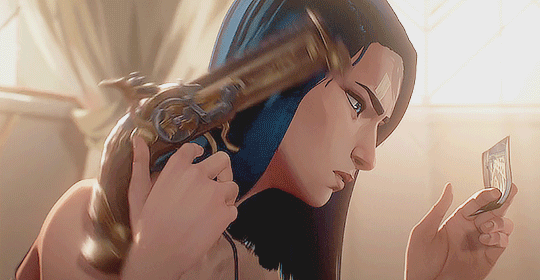
What makes Caitlyn even more compelling is her profound compassion. Throughout Arcane, she consistently shows kindness and understanding, especially toward people from marginalized backgrounds, like Vi and the oppressed citizens of Zaun. Her empathy allows her to connect with others on a deep level, even when they come from vastly different worlds. For example, her willingness to listen to Vi’s perspective and fight for justice in Zaun shows her commitment to doing what’s right, even at great personal cost. This compassion resonates with me, as it’s something I strive for in my own life.
Caitlyn’s canon identity as a lesbian is another reason she holds such a special place in my heart. Her evolving relationship with Vi is a cornerstone of the series, filled with tenderness, mutual respect, and undeniable chemistry. As a lesbian, it’s empowering to see such nuanced and meaningful representation in media. Caitlyn’s love for Vi isn’t just implied—it’s woven into the narrative with care and authenticity, making her a rare and treasured example of queer representation in mainstream media.

Caitlyn Kiramman represents a perfect balance of strength and vulnerability. Her intelligence, compassion, and determination to challenge unjust systems are deeply inspiring. For autistic lesbians like me, Caitlyn is more than just a character—she’s a symbol of representation and hope. Through her, Arcane offers a story where difference is celebrated, where compassion and integrity are strengths, and where people like me can see ourselves as heroes.
In Caitlyn, I see someone who values justice, kindness, and love. That’s why she’ll always be my favorite character.

44 notes
·
View notes
Text
May 2025 Astrology & Pagan News: Grounding, Awakening & Sacred Resistance
As we move into May, the cosmos invites us to slow down, root deeply, and reflect. The fires of April’s eclipse season and planetary upheaval left many scorched—spiritually, emotionally, and politically. Now, May brings healing, reflection, and restoration, but not without moments of awakening and challenge.
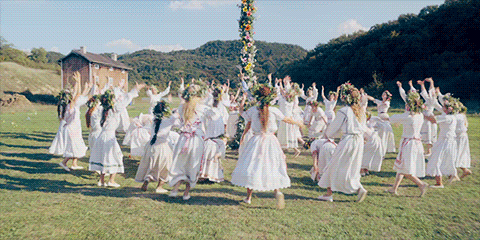
With major alignments in Taurus and Gemini, this month encourages both grounding in what is real and questioning the information we consume. It's a time to tend to our inner gardens while keeping our eyes open to manipulation, censorship, and growing unrest.
Astrological Highlights: May 2025
May 7 – New Moon in Taurus (Planting Seeds of Stability)
This earthy new moon brings a powerful opportunity to set long-term intentions around home, money, nourishment, and emotional safety. Taurus, ruled by Venus, asks us to seek comfort without complacency. After April’s chaos, this lunation is a balm—but also a reminder that true security comes from within, not systems built on exploitation.
Magic for This Moon:
Money & abundance spells (focus on sustainability, not excess)
Kitchen witchery & herbal blessings
Grounding rituals with stones like moss agate, jade, or smoky quartz
May 15 – Mercury Enters Gemini (Watch the Words)
Mercury, the planet of communication, returns to its home sign of Gemini. Expect fast-moving news, intense conversations, and digital energy surges. However, with increased surveillance and AI regulation debates growing louder, witches and spiritual creators may feel the squeeze of censorship.
This is a good time to reclaim your narrative, strengthen digital wards, and be mindful of how language can be used to either empower or confuse.
May 23 – Full Moon in Sagittarius (Truth, Liberation & Sacred Rebellion)
This full moon lights up themes of truth, justice, spiritual freedom, and exploration. Sagittarius energy stokes our hunger for wisdom, higher meaning, and unfiltered truth. Use this moon to burn away lies—personal, political, or societal—and renew your commitment to authentic living.
Magic for This Moon:
Rituals for justice and ethical clarity
Divination for guidance on spiritual path or activism
Bonfire spellwork for burning away deceit
Collective Energies & Pagan Community Insights
The Illusion Cracks Further
Globally, more people are recognizing the cracks in the American façade of “freedom and prosperity.” After last month's eclipse and tech crackdown, the narrative of the U.S. as the world’s moral leader is being openly questioned. Many Americans are facing unbearable housing costs, limited reproductive rights, and a political landscape that feels increasingly authoritarian.
Meanwhile, international protests continue to rise in solidarity with Americans, especially those most impacted: women, queer people, immigrants, witches, and marginalized communities.
Pagan & Witch Communities Rising
This month, many witches are choosing resistance as a form of devotion. Whether through spellwork, community education, or mutual aid, magic is being used to:
Protect reproductive rights
Fight corporate overreach
Dismantle white supremacist ideology
Themes emerging in our circles:
Decolonizing spirituality and returning to ancestral practices
Digital shielding magic to protect voices online
Land-focused offerings to support Earth during Taurus season
What We Can Do in May:
Anchor into spiritual practice—rituals, journaling, shadow work
Support grassroots movements and small creators
Reclaim our relationship with the Earth through food, land, and sustainable magic
Gather in sacred space: host Beltane-after circles or full moon gatherings to connect in-person or online
Important Pagan Dates This Month
May 1 – Beltane Observances Continue: Even if you missed the start, the Beltane season carries through early May. Light candles, dance, or create flower offerings.
May 13 – Hekate's Deipnon (Dark Moon Offering): A powerful time for banishing, protection, and honoring spirits at the crossroads.
May 30 – New Month Blessing Work: A growing trend among modern pagans is blessing the transition into each new month. This is a beautiful way to renew intention and refresh your altar space.
Closing Energy: Reclaim, Reconnect, Resist
May is about rebuilding sacred ground. The magic we plant now may take time to grow, but it will root deeply if done with intention and courage. While the world shakes, our roots hold us—in Earth, in each other, in truth.
You are not powerless. You are sacred. You are needed.
Blessed May.
#astrology#learning magick#witch community#witchblr#witchcraft#witchcraft 101#witchcraft blog#witchcraft info#witches#witchythings
8 notes
·
View notes
Text
Conclave Round 4 Masterpost
Reminder, if you vote for my candidate, I WILL send you a cat picture: for this round, I will also kiss the kitty!! Her name is Miss Pumpernickel and she LOVES kisses!
4-1: Baggio v Soo-Jung: Either are acceptable choices!
4-2: Mẫn v Mangkhanekhoun: Mangkhanekhoun made reforms to the Laotian seminary studies so that seminarians had to learn more about their communities and provide aid. Imo, this continues the legacy Francis had prioritizing pastoral relationships between the church and believers.
4-3: Sanchez v Imeri: Imeri is my pick! In Guatemala, "[Imeri] has been involved in social justice issues, especially in the area of protecting the rights of indigenous people. He has fought against multinational corporations who come to Guatemala for its mineral wealth while destroying the countryside. [Imeri] has empowered the poor and marginalized and fostered civil courage to fight against the injustice they experience."
4-4: Tagle v Pizzaballa: So in addition to the things I've already said about Tagle, in a 2021 interview he talked about his attitudes towards the synodal process, "There is a walking that St. Joseph shows us. He walked dangerous paths with Mary and Jesus, guided by the direction of the angel of God. It is a walking that means protection, that means caring. We hope that during the synodal process, we may develop this capacity to love Jesus, to love the Church. And even if we have some observations that are not always positive, we must do so out of caring, out of loving, so that the name of Jesus will be proclaimed and preserved." I really appreciate a candidate that talks both of the church as a practical living institution but also connecting to the fundamental human stories contained within the gospel.
4-5: Rodrigues v Coccopalmerio: Coccopalmerio is the more acceptable option! In addition to sympathies towards homosexuals and those living in "irregular marital situations," he also believes in reforming the Curia!
The Vatican's former top advisor on canon law has made a public call to insert legal obligations for the care of creation into the Church's universal canon law - making it a legal duty for Catholics not only "not to harm" the environment, but to improve it.
4-6: Sau-yan v Nhơn: Sau-yan is my pick for his connection to Chicago and his interest in broader church communication!
“The important thing is to have more diverse voices, like you have the cardinal, from Mongolia, even though he's Italian, but he speaks for the Mongolian Church. I think the Church is getting richer with different voices.”
4-7: Heung-Sik v Zuppi: Zuppi is an easy pick! He has spoken vociferously against European nationalism, is amenable to priests being married! Zuppi is also for the adoption of "a new pastoral attitude that we must seek together with our L.G.B.T. brothers and sisters" to "help L.G.B.T. Catholics feel more at home in what is, after all, their church."
Zuppi has said, "St. Francis – in a world that was and is fraught with wolves and violent or fearful citizens, by towers and swords, by knights and brigands, by wars and enmity, polluted by so much hatred as to make it impossible to speak of peace – lays out a plan for a fraternal, unarmed world where there is room for everyone, beginning with the poorest and most fragile.”
4-8: Esquivel v Mendonça v Pengo: Mendonça is a strong theologian with an excellent academic career, took an additional vocation with the Franciscans because he admired them so much, and is widely considered papabile in this conclave!
In his preface to the [Sister Maria Teresa Forcades i Vila]’s 2013 book Feminist Theology in History, Mendonça said: "One of the convictions with which this book leaves us is that the future of Christianity greatly depends on the process of ‘clearing out’ of its past and present that we will be able to accomplish. [...] Teresa Forcades I Vila reminds us of the essential thing: that Jesus of Nazareth did not codify laws or lay down rules. Jesus simply lived. That is, he constructed an ethic of relationship; he embodied the poetry of his message in the visibility of his flesh; he displayed his own body as a premise.
5 notes
·
View notes
Text
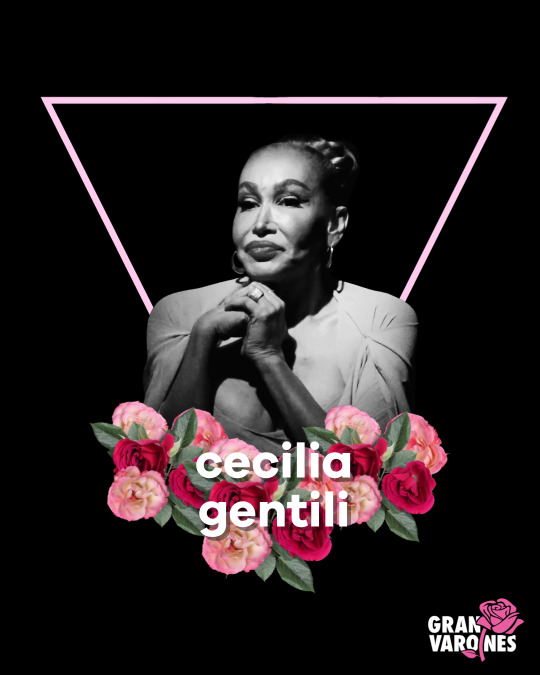
Cecilia Gentili was a trans activist.
Cecilia Gentili was a mother.
Cecilia Gentili was a friend.
Celicia Gentili was an icon.
Celicia Gentili was here.
Cecilia navigated an often unkind world with a disarming and empowering grace. Her journey from Argentina to the heart of New York City was not merely a search for sanctuary but a quest to make the invisible seen, the silenced heard, and the marginalized celebrated. Her activism was her art, and her art was a form of activism. Cecilia painted vivid pictures of resilience, struggle, and triumph through her storytelling. She brought to life the experiences of the trans community, advocated the decriminalization of sex work, and supporting those living with HIV/AIDS. Cecilia's voice was a clarion call for justice, echoing in the corridors of power and the streets, demanding change, equity, and love.
Cecilia was a force.
Cecilia's legacy is not only in the many movements she helped shape or the policies she influenced, but also in the lives she touched. She mentored many, sharing her wisdom, warmth, and wicked sense of humor, oh so generously. To be loved by Cecilia was to be seen in your entirety, embraced for who you were, and inspired to become who you might be. I know this from personal experience. Her capacity for love was boundless, and she gave it freely, fiercely, and without reservation.

Cecilia was a healer.
Like her activism, her art reflected her soul—bold, beautiful, and transcendent. Cecilia used her creativity as a tool for advocacy; her performances and storytelling were not just entertainment but powerful statements on identity, society, and the human condition. Through her art, she challenged systems, questioned injustices, and oriented communities in the discipline of hope.
Cecilia was a teacher.
Cecilia Gentili leaves behind a world forever changed by her presence. She showed us that change is possible, that love is powerful, and that living one's truth is the ultimate form of resistance. Let us honor her memory by supporting one another with compassion, living our truths, and building the world she knew we all deserved.
Cecilia is now an ancestor.
Rest in power, Cecilia. Your journey here has ended, but the love you left us is everlasting. We love you, miss you, and will never forget you.
39 notes
·
View notes
Text

Education
We’d venture to guess that one of the common threads that unites our fandom is a belief in the power of education and all that comes with it. Taking down barriers to literacy, higher education, and other forms of knowledge-building, these organizations are working to ensure everyone has access to the transformative power of ideas and resources for personal and professional development.
For more information on donation methods and accepted currencies, please refer to our list of organizations page.
Amputee Coalition
The Amputee Coalition supports and advocates for people impacted by limb loss and limb difference as well as their families and caretakers across the globe, and one of the ways they do so is through their educational programs. They developed the National Limb Loss Resource Center which offers information on a plethora of topics related to limb loss/difference, provide educational publications and webinars, and have a youth engagement program that covers everything from life skills and training programs, career development, and more.
Autistic Self Advocacy Network
The Autistic Self Advocacy Network seeks to advance the principles of the disability rights movement with regard to autism. ASAN believes that the goal of autism advocacy should be a world in which autistic people enjoy equal access, rights, and opportunities and have their voices heard. For that reason, the organization is run by individuals on the autism spectrum. In addition to advocating for policies that protect disability and civil rights, ASAN creates tools and leadership training for autistic self-advocates and offers a wide variety of educational resources.
The Pad Project
Period stigma and lack of access to affordable, safe, and effective menstrual products are a global problem, one that disrupts and limits access to education and employment for many people who menstruate. The Pad Project tackles this issue through increasing access not only to menstrual products but also education. They conduct workshops on menstrual hygiene management and sexual and reproductive health and have an award-winning documentary, Period. End of Sentence. Additionally, they aim to integrate menstrual hygiene management and puberty education into school curricula internationally.
Southern Poverty Law Center
If there is injustice against a vulnerable and/or marginalized group in the U.S., SPLC aims to address and fix it through a myriad of ways including their education program, Learning for Justice. Learning for Justice offers free resources, such as magazines, podcasts, films, training sessions, webinars, etc. to more than 500,000 caregivers, teachers, administrators, counselors, and other practitioners who work with children from kindergarten to high school. Their justice-focused approach helps students and educators learn how to become involved in activism, tackle prejudice, and create more civil and inclusive communities.
World Literacy Foundation
Reading opens doors, both to other worlds and in real life. When someone acquires literacy skills, they're able to access better opportunities and societal integration; they can gain better healthcare access, fill out job applications, and more. The World Literacy Foundation provides disadvantaged children with books, educational resources, and literacy support, and they use innovative tech, e-books, and digital activities to advance the learning of children in remote areas. On a community level, the WLF equips parents to support their children in their learning through mentorship programs and empowers people to advocate for literacy in their communities.
12 notes
·
View notes
Text
currently i disagree (somewhat) with that quip from marx. or at least that religion itself is a problem. opium of the masses. i don't think either spiritual belief per se, or organization, even around shared supernatural belief, is itself a bad thing. which is quite a change for me, so hear me out
i think the religious organization that marx and many of us live under is an opiate, a numbing system enforced and empowered by class hierarchy to perpetuate status quo. absolutely, a world where people believe god has chosen to put the current leaders in charge is one where people are much more resistant to change.
but, i also don't believe that spirituality need be constrained to mere superstitions or to centralized numbing systems. even organized religion, though at high risk of becoming a locus of power, could be liberatory in material ways, and a site of learning about power and solidarity. and i dont mean just, despite itself, it can be a place where labor organizes, or it can be a place of charity, you know, the patronizing of lower/marginalized class.
i mean if we had organized religion that was less... superstitious, i'll say. less about submitting to the status quo as a substitute for the infinite god. less about picking out purity, pecking order, contamination, submission to earthly authority and love of violence, punishment, coercion, enforcement.
none of those are inherent to spirituality, and i consider most of them aberrant, cancerous disease to spirituality. hatred is a sickness in the body of god, and we are the body of god, and we have the power to heal that body. we can be an immune system, building love and care and community, and as bones and joints, doing the good work with our smaller hands. hatred is a spiritual sickness, literally; hatred is a self-destructive immune response, greed-jealousy are cancerous growth of what should be freely shared love. i could go on. that's not as important to my point. what i mean to say:
if our religions were genuinely concerned with doing good works for all of earth and humanity, all life and all existence. if we were doing justice to each other and our place. and if we recognized that 'religion' based on fear of punishment, or on casting judgement as if we are impartial judges, or on hoarding wealth, or whatever. if we recognized that it is 'religion' or 'faith' in name only, if we recognize it as mere superstition with no love or kindness or thought behind it, a group-psychology shared mass panic, you know. if we had that goddamn conversation about how people talk about love and then don't know how to act in love.
it could be that we recognize religion to be a shared material project, motivated by spiritual philosophies, where communities come together to do ritual that allows them to serve goodness and produce good.
...in theory. this isn't really a problem with marx, he's accurately describing what self-described major religion considers itself to be in our time. so i can't really say he's wrong, or even that i fully disagree with what he... meant? at least partially meant. religion, as practiced in our capitalist societies today, is meant to neutralize us. to kill pain without treating the root cause of it. to pacify, to... and this isn't always true of any individual church, either, when you think about the organizing for black civil rights done so often at churches.
and that's what i mean, is the relationship to the divine in community can produce dignity and deep care. if spirituality is a prompt to make the world better, to see heavenly good on earth, to act as saints or sages or healers or teachers. then that facet of religion can be liberatory. if you actually fully believe god wants us to be happy and to protect one another and to love one another, then you're almost forced to act in this way.
but if you believe that god hates us unless we pray a certain way and god wants us to distrust one another and to judge one anothers sins and to punish each other for not conforming to what gods definitely-for-real authority on earth says, source dude trust me, then religion will be a destructive, reductive, neutralizing, numbing, de-fanging and de-radicalizing force. if it's all gods plan, no need to fight. someone else will do it. god will just fix everything one day. no need to think about it. no need to do anything but pray. once a week. no need to think or talk about how to make the world better. better not try to think or change anything, you might make god angry, and then you'll be punished. that's what god wants you to focus on, not good or love or mercy, but how to not get punished. just live in constant anxiety, ready to yell at or beat your neighbor for stepping out, too. you wouldn't want god to punish you for their sins, too. just think about how god is angry jealous cruel powerful and ready to punish your forever, really.
yes, if that's our 'religion' then i certainly see why it would be an opiate. slowly destroying our ability to feel deeply or care or think ahead, numbing us to our pain, but only enough to keep us coming back for more.
religion doesn't have to be that, but. i'm not sure what else marx would have called it, i guess. so fair enough.
4 notes
·
View notes
Text

The time to strike back is NOW.
Tonight, under the blood moon, we reclaim what’s ours. We strike down the oppressors and protect those who need it most. We dismantle the old systems, and in their place, we create a world of beauty, justice, and freedom for all. Magic is not just for spells; it’s for the action we take to manifest real change.
Simple spells & actions for tonight:
• Protection spell: Light a red candle and visualize a shield of energy surrounding you, your loved ones, and marginalized communities. Say: “By the power of the blood moon, I protect what is mine and defend the oppressed.”
• Dismantle the old: Write down what no longer serves us—oppressive systems, societal structures, or personal fears. Safely burn it, releasing it to the flames. Say: “The old must burn to make room for the new.”
• Plant seeds of change: Plant a real seed—whether it’s a physical plant or a symbolic one in a jar. As it grows, so will your efforts for justice. Water it with intention.
• Invoke ancestral power: Light a black candle, and ask your ancestors for guidance in breaking cycles of oppression. Say: “I call upon my ancestors to guide me in breaking chains and reclaiming what’s rightfully ours.”
• Empower marginalized voices: Write down a prayer or affirmation for the empowerment of marginalized communities. Speak it aloud under the moonlight, sending your energy out into the world.
• Earth healing ritual: Find a patch of earth to honor. Speak your intention to heal the planet and protect its inhabitants. Leave an offering of herbs or crystals for the earth.
• Social justice magic: Write a letter or make a commitment to take direct action for justice in your community. Light a candle as you write it, infusing your words with power.
Tonight, we take back the world. We fight for what’s right. We create, protect, and dismantle. This is our moment. ✨🌕
#thechaoswitch#witch community#witchcraft#witchcore#spirituality#spiritual#witchblr#tarotcommunity#blood moon
3 notes
·
View notes
Text
Why is Social Justice Important
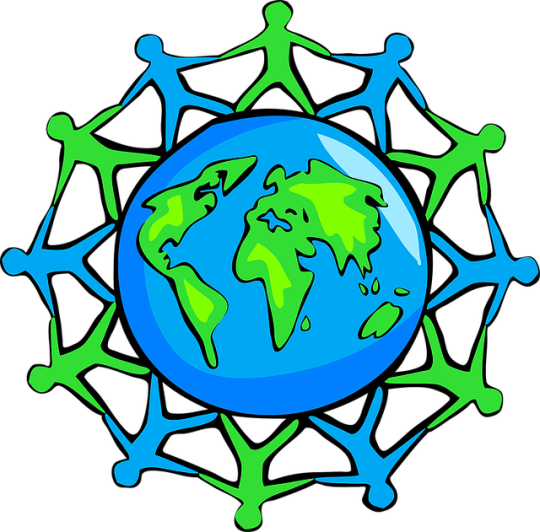
Equity and Fairness. Social justice promotes the idea that all individuals deserve equal rights and opportunities, regardless of their background, identity, circumstances. It seeks to address inequalities and ensure that everyone has a fair chance to thrive.
Human Dignity. A focus on social justice recognizes and upholds the inherent dignity of all individuals. It challenges practices and systems that dehumanize or marginalize certain groups, fostering a more inclusive society.
Empowerment. Social justice initiatives aim to empower marginalized or disadvantaged communities. By addressing systemic barriers, individuals can gain the resources and opportunities necessary to improve their lives and communities.
Social Cohesion. A commitment to social justice can enhance social cohesion and harmony by fostering understanding, respect, and collaboration among diverse groups. This can lead to a more cohesive society where differences are valued rather than feared.
Economic Stability. Addressing social injustices can lead to a more equitable distribution of resources and opportunities, which can contribute to overall economic stability. When everyone has access to education, healthcare, and employment, communities are more resilient and prosperous.
Sustainable Development. Social justice is often linked to sustainable development goals, as addressing social disparities is crucial for achieving environmental and economic sustainability. Social equity ensures that development benefits are shared by all, not just a privileged few.
Active Citizenship. Social justice encourages individuals to be active participants in their communities and societies. This can lead to increased civic engagement, accountability, and a stronger democracy, as more voices are included in decision-making processes.
In this way, social justice is foundational to creating a fair and equitable society where individuals can achieve their full potential.
#SocialJustice#JusticeForAll#EqualityForAll#SocialJusticeMatters#JusticeAndEquality#HumanRights#RightsForAll#Awareness#EducateToEmpower#CommunityMatters#Activism#BeTheChange#StandUpForJustice#TogetherForJustice
3 notes
·
View notes
Text
The Philosophy of Economic Development
Economic development refers to the process through which a country or region improves its economic, social, and political well-being. It goes beyond mere economic growth, focusing on broader improvements such as quality of life, equitable access to resources, and sustainability. The philosophy of economic development involves the exploration of values, principles, and strategies that guide efforts to elevate living standards, reduce inequality, and promote social justice.
Core Principles of Economic Development
Human Well-being and Quality of Life Economic development is not just about increasing wealth, but improving the overall quality of life. This involves not only economic metrics like income and employment but also health, education, access to basic services, and environmental sustainability.
Sustainability Sustainable economic development ensures that current growth does not come at the expense of future generations. This encompasses responsible resource management, environmental protection, and long-term social stability.
Equity and Inclusiveness Development should aim to reduce inequality, ensuring that the benefits of growth are shared equitably among all segments of society. This often includes addressing poverty, gender inequality, and regional disparities.
Freedom and Empowerment The philosophy of economic development values individuals’ freedom to choose their path in life. This involves creating an environment where people can access opportunities, make decisions, and have control over their economic futures.
Participation and Democracy Genuine development is participatory and involves empowering local communities. Democratic governance structures enable people to take part in the decisions that affect their lives, ensuring that development initiatives reflect local needs and aspirations.
Philosophical Approaches to Economic Development
Neoliberalism Neoliberal thinkers advocate for minimal state intervention in the economy, believing that market forces, competition, and private enterprise lead to more efficient allocation of resources. They argue that deregulation, privatization, and free trade stimulate economic growth and improve living standards.
Structuralism Structuralist approaches, rooted in the works of economists like Raul Prebisch, argue that development requires transforming the economic structure of a society. This may involve diversifying economies away from primary exports and fostering industrialization, technology, and education. Structuralism also advocates for addressing historical inequalities between developed and developing nations.
Dependency Theory Dependency theory critiques the global economic system, arguing that poorer nations remain economically dependent on wealthier ones. It asserts that economic development cannot occur without addressing global inequality and suggests that developing countries should resist exploitative international systems and focus on self-sufficiency.
Capabilities Approach Developed by philosophers like Amartya Sen and Martha Nussbaum, the capabilities approach focuses on expanding individuals' abilities to achieve their well-being. Development is seen not just as economic output but as the expansion of freedoms, opportunities, and capacities to lead a fulfilling life.
Human Development and Well-being Human development, as championed by the United Nations Development Programme (UNDP), emphasizes improving people’s lives through access to health, education, and economic opportunities. It expands the concept of development beyond GDP growth, focusing on broader human development indicators.
Ethical Considerations in Economic Development
Justice and Fairness Economic development often raises ethical questions about fairness and justice. How do we ensure that the fruits of development reach the most marginalized? Are the benefits of growth distributed equitably?
Cultural Sensitivity Globalization and development may clash with local traditions and ways of life. How can development policies respect cultural diversity while promoting progress?
Environmental Responsibility The growth that drives economic development can often harm the environment. Ethical economic development seeks to balance economic success with ecological sustainability, protecting ecosystems and promoting green technology.
Rights-Based Development Some philosophies assert that economic development should be driven by respect for human rights, focusing on the right to work, access to education, the right to food, and social security. Rights-based frameworks aim to ensure that development benefits all people, particularly the most disadvantaged.
Challenges and Criticisms
Economic Inequality While economic development can lead to prosperity, it often exacerbates social inequality. The gap between the rich and poor, both within nations and globally, remains a persistent challenge in achieving truly inclusive development.
Sustainability Issues Rapid economic development can result in environmental degradation, depletion of natural resources, and long-term ecological damage. The challenge lies in balancing immediate economic gains with the need for environmental stewardship.
Cultural Imperialism Economic development often brings Western-style capitalism, technology, and values into non-Western societies, leading to criticisms of cultural imperialism. These critiques question whether true development is possible without compromising cultural identity.
Political Corruption and Mismanagement In many countries, political corruption, ineffective governance, and the lack of infrastructure can hinder the success of economic development initiatives. Ensuring transparent, accountable leadership is essential for sustainable progress.
Conclusion
The philosophy of economic development encompasses diverse theories and practices aimed at improving the well-being of individuals and societies. At its core, it recognizes that economic growth is not an end in itself but a means to greater human flourishing. By addressing the ethical, social, and environmental dimensions of development, philosophers and policymakers alike strive to create an equitable, just, and sustainable future for all.
#philosophy#epistemology#knowledge#learning#education#chatgpt#economics#Economic Development#Development Philosophy#Philosophy Of Economics#Economic Justice#Global Development#Sustainable Growth#Moral Economy#Socioeconomic Ethics#Growth And Ethics#Development Theory#Human Development#Equity And Economics#Philosophy Of Progress#Political Economy#Economic Ethics
2 notes
·
View notes
Text
⋆. 𐙚 ˚ Social Justice & The Future Of Psychology

Janet E. Helms, "Presently, psychologists’ research, teaching and professional practice vacillate between defining the political constructs of races as makeshift theoretical concepts, contextual factors or nuisance variables, while virtually ignoring the psychological effects of internalized racism on perpetrators and survivors. Racial identity theories instead use diagnoses of the different manifestations of internalized racism to develop and apply psychological interventions to overcome the afflictions of race and racism. Ideally, in the future, racial identity theories will become extinct because racism will no longer exist. But realistically, the question that still needs to be answered is how to encourage psychologists to use racial identity theories to understand and improve human behavior."
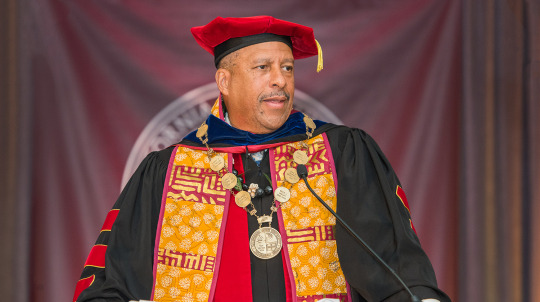
Thomas A. Parham, "Given our positions as caretakers of the mind, heart and spirit of the people, psychologists must challenge ourselves—like Dr. Martin Luther King Jr. did when he spoke before us at the 1967 APA Annual Convention—to tell America about both the rage and hurt that simmer below the surface in black and other communities of color and to help much of white America confront and challenge the denial it seems to live in about what life is like for their culturally different counterparts who live on the margins of society. One place to start is to help America brave the question of: What allows each of you (us) to bear witness to the suffering of others, sit in silence and still maintain our humanity? Is that what integrity looks like?"

Lillian Comas-Díaz, "To enhance inclusion, psychologists will expand the diversity construct by including every group that has been perceived as 'the other.' Moreover, psychologists are required to engage in social justice advocacy"

Douglas Haldeman, "[...] psychology needs to address the issues associated with the intersection of sexual orientation, gender identity, race/ethnicity, socioeconomic status, ability status, age and who we in the LGBT communities are to each other and the mainstream world. This requires an examination of power and privilege, and how we use our influence—and our unity— to advocate for the issues that are important to all persons of diverse identity. What psychology can offer to unite us as allies will be paramount in these times of unprecedented social polarization."

Richard Lee, "How do we move beyond current narratives, theories and methods that are culturally bounded by white/ European epistemologies to answer questions that affect the majority of the world’s population that is not white? We need new ways to understand and study health disparities, transnational migrations, intergroup conflicts, and the successful adaptation and accommodations of groups of people who are subordinated, underrepresented and underserved."

Melba J.T Vasquez, "How can we empower and inspire psychologists to recognize, incorporate and utilize their knowledge and skills to promote various strategies at multiple levels to make a difference, particularly in intractable problems such as poverty, immigration, insidious bias and addiction? In today’s climate of increased oppression and antagonism, psychologists can elevate their voices for systemic change. Through the integration of science, practice and education, we have the potential to promote constructive changes to improve the immense challenges in society."
3 notes
·
View notes
Text
Latino Twitter/X Is Here to Stay. Oyes!
Latino Twitter/X is a dynamic and influential space on the social media platform that has transformed how the Latino community communicates, organizes, and expresses its cultural identity. Over the years, this digital ecosystem has emerged as an essential forum for dialogue on social, political, and cultural issues uniquely relevant to Latinos. It serves as a vibrant meeting point where voices across diverse backgrounds converge to discuss challenges, celebrate achievements, and advocate for change.
One of the most significant aspects of Latino Twitter/X is its role in political mobilization and social activism. With the power of hashtags and trending topics, users amplify voices that are often marginalized in mainstream media. Movements addressing immigration reform, social justice, and economic equality gain momentum on this platform, enabling rapid dissemination of information and coordinated action. This immediacy and connectivity empower individuals to rally around common causes and build a collective identity that spans geographic borders and generations.
In addition to its political impact, Latino Twitter plays a vital role in cultural expression and preservation. It provides a space for sharing music, art, literature, and personal narratives that enrich the cultural tapestry of the community. Through humor, poignant commentary, and storytelling, users forge connections that transcend socio-economic barriers and geographic distances. This cultural exchange not only reinforces a sense of pride in Latino heritage but also challenges stereotypes by showcasing the community’s diversity and resilience.
Ultimately, Latino Twitter is much more than a social media trend, it is a powerful tool for community building and social change. By giving voice to experiences that might otherwise remain unheard, it helps shape public discourse, influence policy debates, and foster a more inclusive society. In a world where digital conversations often set the agenda, the importance of Latino Twitter continues to grow, reflecting and driving the evolving narrative of the Latino community.
2 notes
·
View notes